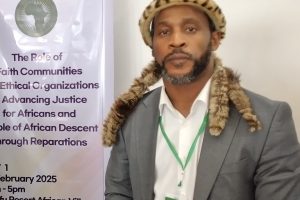
Has South Sudan’s time of salvation
really come?
Last week’s inauguration of Reack Machar as South Sudan’s vice-president was not an occasion for true celebration. It was rather a grim reminder that the process leading to the formation of the latest unity government has taken seven years and cost the lives of 400 000 innocent civilians and the displacement of millions more. It was rather a reminder of a tragedy that has been repeated several times in the past simply because the two leaders of the two ethnic groups, namely the Neur and the Dinka could not overcome their political egos and bury their hatchets
sooner rather than later.
The civil war in South Sudan which started back in 2013 is another case of a political crisis within the ruling movement that degenerated into ethnic clashes as the respective political elites brought their differences into the ethnic groups that had nothing to do with the leadership crisis. Once a crisis in the political leadership went
out of hand, it spilled over to their followers dividing the army along those same ethnic lines. That is the most dangerous division in any African country with serious ethnic cleavages that make elite-based political bargains virtually impossible or unproductive.
The differences between Machar and Kiir were further intensified and became difficult for settlement for many reasons. Both leaders claim the presidency as the main guarantee to protect the vital interests of the respective ethnic groups they represent.
The senseless enmity between the two heavy weights of South Sudanese politics was further aggravated by the absence of an authoritative political figure like the late John Garang, who could have served as a stabilizing factor of the country’s troubled post-independence politics. Mistrust between Machar anbd Kiir was therefore the source and catalyst of the conflict that refused to go away despite relentless regional as well as international peace efforts.
Another factor that cannot be overlooked in south Sudan politics is the discovery of the oil wealth that sits beneath the country and is estimated to be worth billions of dollars. As a recent report by Al Jezeera indicated, in February 2019, the United Nations Human Rights Council released a report describing what it believes is funding the war: the country’s rich oil industry. It said that the state-owned Nilepet oil company “has diverted oil revenues which should be shared with states into the coffers of elites in the government,” and that its operations “have been characterized by a total lack of transparency and independent oversight.” Thus South Sudan’s oil wealth has turned from a blessing into a resource curse that fed the war and brought the various elite groups into apparently irreconcilable contradiction.
Despite the fact that South Sudan is endowed with vast oil wealth, the political elites have been unable to use it in order to address the economic and social problems of the people on both sides of the ethnic divide.
On the contrary, the South Sudanese people have become victims of massive famine and generalized poverty and this is also the factor that has forced the conflicting elite groups to accept the final peace deal brokered by the international community. They were practically unable to continue the civil war because of the prevailing economic crisis while the rampant corruption surrounding oil money, has depleted national resources and made it impossible for the respective elite groups to attain dominance over one another.
The corruption surrounding the oil wealth of the country has been documented by many quarters. According to one source, “ with a lack of transparency – one organization obtained secret documents suggesting that Nilepet paid $80m to war-related officials and activities over a 15-month period beginning in March 2014 – the concern is
that these expansions would simply deepen corruption. South Sudan ranks 178 out of 180 countries on Transparency International’s corruption index although South Sudan’s president has initiatives to address these issues. “Corruption is everywhere in the world but the most important thing is how you deal with it,” the source said.
However, some political elites from the ruling group in the government tend to deny this allegation. The Al Jazeera report quoted above said that The country’s oil sector is supervised by the minister of petroleum, Ezekiel Lol Gatkuoth, who denies the UN’s allegations and others. “I have been in the Ministry of Petroleum since 2016 and I can assure you there is no single dollar that has been used to buy arms in the ministry and even in the country,” Gatkuoth told Aljazeera. “The focus is peace, peace, peace.
We are not investing in war and we will not at all invest in war … Nilepet has not been financing any activities that is related to violence in the country.” the oil minister was also quoted as saying that expanding the country’s oil production- oil makes up 60 percent of the country’s gross domestic product (GDP) and almost all of its exports – and attracting foreign investors, will increase the money available for development projects.
One of the sticking points in the latest peace process was the division or re division of the country into 10 or 32 states in accordance with the respective wishes of the conflicting elite groups. “The number of states is contentious because the borders will determine the divisions of power in the country. When it gained independence from Sudan in 2011, South Sudan had 10 states, as set out in its constitution.
Kiir increased that in 2015 to 28, then later 32. The president said the final matter of states would be debated once the unity government is formed.” While the latest peace deal is a welcome development both internationally and in
the Horn of Africa region, there are still contentious issues that are proving difficult to make the peace process stick in the short term perspective.
South Sudan is dealing with tens of thousands of armies and militias formed by both the government
and opposition groups and the question of human rights abuses and massive exiles of millions of South Sudanese will inevitably test the patience and resources of this small east African country. “Major challenges in the peace process remain, including the delicate process of integrating tens of thousands of former rival forces into a
united army. Widespread abuses such as the recruitment of child soldiers and sexual violence continue, a new report by the UN Commission on Human Rights on South
Sudan.”
Despite the latest developments, the political situation in South Sudan is also worrying if we go by past records. The country’s political elites have been talking peace when the going goes tough for them while backsliding on the their promises whenever they feel they are stronger than the other party to impose their will and their hidden agendas on one another.
Thus, the pervasive lack of trust among the ruling elites may still be something one has to look cautiously because of records of failed promises and repeated talks of unity in the past. Aljazeera further noted that, “The two rivals agreed on a peace deal in 2018, pressured by the United Nations, the US and countries in the region. Under the
deal, they agreed to form a unity government in May 2019 but missed the deadline amid disputes over territory and security arrangements.
A second deadline of November last year was also missed and pushed back by 100 days, prompting Washington to recall its ambassador and impose sanctions on senior officials for their role in perpetuating the
conflict.”
The hope for lasting settlement of the South Sudanese conflict is largely based on the fact that the people of the country can no more endure the tragic situation because they have long passed the political tipping point. A once promising country has been turned into a land of untold suffering and going beyond the red line would turn the
country into a totally failed state like the one in neighboring Somalia where civil war has long taken an absurd and tragically surrealist dimension.
Neither Machar nor Kiir are now in a position to implement their old plans for the country that have already proved not only untenable but also recipes for total disaster. However the current settlement will no doubt see its strongest test when the time will come for the two rival leaders to agree to bury their hatchets and never unearth it under any circumstance. And this will take a rather long time before the country turns from political sickness to fast recovery or normalization.
The international community should be commended for achieving last week’s diplomatic breakthrough. The job of
closely supervising the peace process and the implementation of the latest deal and its readiness to address any problems as soon as they crop up and not wait until they assume grotesque dimensions, remains
the challenge for the UN and its regional partners like IGAD. Whether South Sudan’s real salvation has come or not however remains the greatest enigma and something that is the object of great expectations and
worries by all who have been tormented by the country’s tragic fate.
The Ethiopian Herald Sunday edition March 1/2020
BY MULUGETA GUDETA





